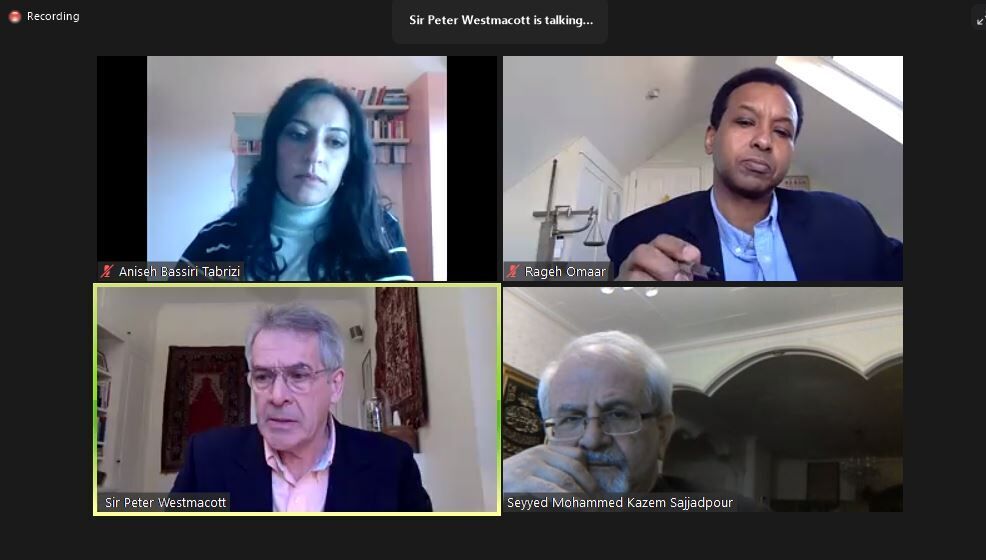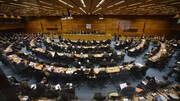According to the IRNA correspondent in London, in the virtual event sponsored by Forum Qatar sub-institute of RUSI, former British diplomat Peter West Mccourt, a RUSI senior researcher, Ensieh Bashiri-Tabrizi, and an Iranian senior diplomat Seyyed Kazem Sajjadpur presented their viewpoints.
Seyyed Kamal Sajjadpur, the first speaker in the event, focused on the defeat of the US maximum pressure policy, which was later approves also by Peter Maccourt.
Mccourt emphasized that America’s maximum pressure policy reached the end of a dead-end alley, the other sides of the JCPOA are now experiencing new conditions, and coming to power of the new US administration has provided new opportunities.
The former British diplomat said that the issue is not as simple as an exit and a re-entry, since the exit was by the former US president and this entry must take place by the ruling president.
“Iran has its reasons for waiting for the Americans to rerun to the nuclear deal, and if the JCPOA is collapsing, it is the others’ responsibility to rush to its rescue,” he said.
Maccourt who was once an ambassador said that the Americans say they are ready to begin a dialogue, arguing that the other issues, too, are in need of discussion. He said that Iran can as a sign of its goodwill, control its allied forces in Iraq and Syria, and respond positively to the US favorable decision in Yemen.
Ensiyeh Tabrizi focused on the EU stand, saying that the Europeans’ strategy, including that of the EU-3, France, Britain and Germany, has been multi-faceted.
According to her, the Europeans believed that the JCPOA needs to be preserved before Biden took charge and at least intended to act according to their commitments, although they failed. But when Biden entered the White House their stands have been changed and now their policies are multi-faceted, inclined towards the inclusion of new issues in a new JCPOA.
The speaker also focused on the newly established relations between some Arab countries in the Persian Gulf region and the Zionist regime of Israel, reiterating, “Although their relations have now improved, talking about the reality of their ties is not so simple. Also, about the Iranian nuclear program, they might have a shared stand, but their viewpoints within the Arab countries’ societies on type of relations with Iran differ greatly.”
Sajjadpur, the next speaker at the discussion, said that Iran has managed to govern the US sanctions and even achieve a degree of economic growth. According to him the self-confidence of the Iranian decision-makers is high because they say we have managed to tolerate the worst US president’s antagonist policies.
The Iranian diplomat said that still there is no justification for the sanctions, since the Americans’ behavior was illegal, inhumane, and in addition, based on a brutal assumption: imposing pressure against the Iranian nation will urge them to eventually riot against their own political system.
“Let us not forget that the US maximum pressure policy has faced defeat now,” he added.
The analyst reiterated that the US return to JCPOA is not related to other issues, since the JCPOA is an international agreement that is confirmed by the UN Security Council whose implementation is obligatory, and therefore, demanding inclusion of new issues and exit from JCPOA based on that excuse is both illegal and illogical.
The chairman asked Sajjadpur does he not think that due to the emerged changes in the international and regional scenes demands for changes in JCPOA, too, are logical?
The Iranian diplomat responded: Has the world not changed since the year 1945? Yet the United Nations, that is the final result of the end of World War II is still running on the same basis.
“You cannot sign an international agreement and then disrespect your own signature,” he said.
On entry of the regional countries to a new round of negotiations, he said: Those countries had initially been opposed to the JCPOA, and nothing has changed since then.
He argued that based on your mentality the international conventions and treaties are all in need of permanent alterations because the world is subject to constant changes with the passage of each new day.
Peter West Mccourt referred to Iran’s regional moves, arguing that attacking oil tankers has intimidated the regional countries. He also referred to chanting “Down with Israel” slogans and writing anti-Israeli mottoes on Iranian missiles as causes for regional unrest.
The British diplomat said he understands Mr. Sajjadpur’s arguments and confirms that Iran had remained committed to JCPOA, but the newly emerged status is that if diplomacy will face defeating it is the Iranian nation that will suffer pains and sorrows.
1424
Follow us on Twitter @irnaenglish





Your Comment